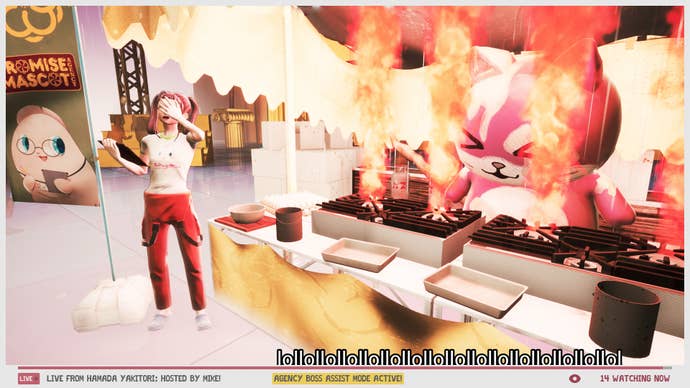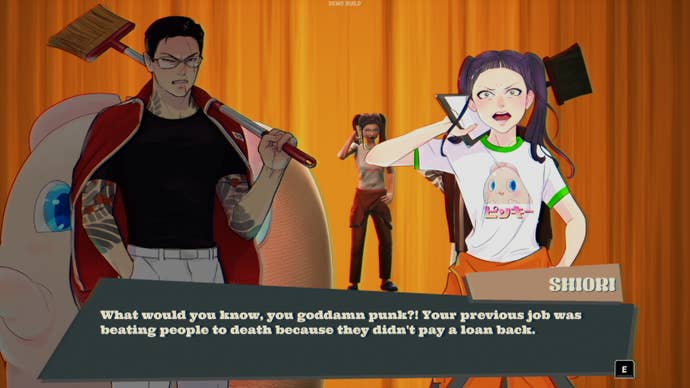“I think it’s not always easy to explain what the game really is,” says Oli Clarke Smith, director at Promise Mascot Agency, during our conversation.
“We’ve noticed that challenge. Initially, we described it—and still do—as an open-world mascot management crime drama, which we understood, but I don’t think it captured the game’s essence fully.”
“We’ve created a complete open-world RPG with management and creature-collecting elements,” Clarke Smith continues. “Once people dive into it, they have a huge ‘aha’ moment and get what we’re aiming for.” It’s been encouraging to see the early reviews for their “band of freaks” from Paradise Killer studio, Kaizen Game Works, being overwhelmingly positive as they unveil more about their 2025 project.
The game’s quirky characters include sentient mounds, cats against adult video censorship, and unique companions like Mottsun, who stand out as memorable mascots. Players will manage these characters in the world of Promise Mascot Agency, developed through collaboration between Kaizen’s British team—Clarke Smith, technical director Phil Crabtree, and art director Rachel Noy—and renowned Japanese artists Ikumi Nakamura and Mai Mattori.
“We approached her with nothing concrete,” Clarke Smith explains, “since we’d just wrapped up our previous game. We had a rough concept [for Promise Mascot Agency] and knew it was important to collaborate with someone from Japan, considering we’re a Western team creating a game set there. The mascots she designed offered fresh perspectives and cultural insights we wouldn’t have achieved on our own.”
Although Kaizen wants its games to retain a distinct style, they welcome input and spin from collaborators like Nakamura. “It brings diverse lived experiences into the game,” Clarke Smith mentions, sharing how Nakamura’s stories about real-life experiences in Kyushu influenced the game setting of Kaso-Machi.
Nakamura recounted feeling like an outsider in a small coastal town—an essence that wound its way into the game’s development and atmosphere. This specific sense of being the “other” resonated with Noy, citing similar experiences in British regions like Cornwall. “We also binge-watched Twin Peaks,” she laughs, “which was a major influence and why we involved Swery.”
As the game’s development progressed, compromises had to be made, like resizing Nakamura and Mattori’s mascot designs to ensure seamless animation. Clarke Smith acknowledges, “Sometimes, tweaks meant fitting 90% of an idea into the game’s structure.”
This game presented new challenges compared to their debut, Paradise Killer. Clarke Smith recalls, “With Paradise Killer, it was just Phil and me figuring out game development together.” Transitioning from a mystery to a management game was conceptually challenging but simpler in execution as the team adapted.
Crabtree adds, “We reused some systems from Paradise Killer, so while the core coding was done, we had space to refine game design.” Early on, intricate management systems were considered but were shelved as they clashed with the game’s laid-back vibe. “The management aspect now sits quietly in the background—a balance between simplicity and underlying complexity,” he explains.

Managing your mascots involves overcoming fun obsctacles based on what Crabtree calls “a list of random potential disasters” inspired by YouTube mascot bloopers. Like the famous Funassyi clip, these scenarios had to be feasible and include “bail resolutions” for player intervention.
The game’s journey began with Noy’s idea for a mascot management simulator akin to Kairosoft’s Game Dev Story. “We wanted more than a basic 2D sim,” Clarke Smith remarks, “questioning its longevity for the company.”
Some features got pruned, like loans and races with characters Michi and Pinky in their kei-truck. “These ideas never fully formed because typical open-world games already cover them,” Clarke Smith notes. “We didn’t need that extra gameplay.” Still, they linger as potential content or a nod to classic racing in Japan should the opportunity arise.

Before looking towards expansion, Promise Mascot Agency’s upcoming release is Kaizen’s focus, and their confidence is growing. “For a small team, this is a huge achievement,” Crabtree reflects. “I’ve replayed the early game countless times, and it still surprises and delights, much like Paradise Killer did.”
Noy shares, “I’ve fallen for these characters and will miss working with them. I believe others will love them too.” There’s apprehension, but past success with Paradise Killer reassures the team.
“We’ve made the game we envisioned,” Clarke Smith asserts. “We know people appreciated our previous writing and characters, and we’ve infused those elements here. So, if it resonates, players will really enjoy it.”








![[FREE Game] Giveaway for Lost Records: Bloom and Rage on PlayStation 5 (NA) [FREE Game] Giveaway for Lost Records: Bloom and Rage on PlayStation 5 (NA)](https://www.gamerfrontier.net/wp-content/uploads/2025/04/FREE-Game-Giveaway-for-Lost-Records-Bloom-and-Rage-on-360x180.jpg)






































